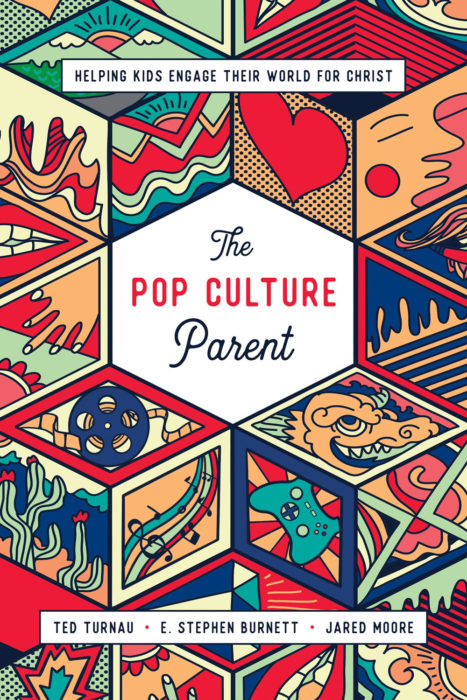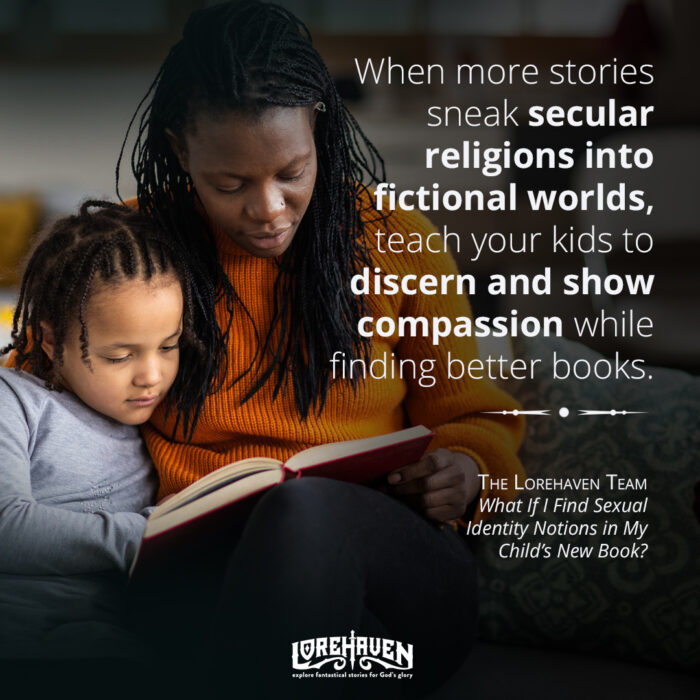What If I Find Sexual Identity Notions in My Child’s New Book?
Christians parents are discovering a serious side effect of our new neutral world.1
It happens when relatives give your child a new popular book, or your child learns of the title and can’t wait to read it. The cover seems friendly enough. It’s fantastical and whimsical. Maybe it features a wide-eyed hero your child’s age who goes on an amazing journey. Then your parent-senses start tingling. Something’s not right.
You open the book and confirm it. This story is sneaking in a “not-so-secret” agenda of we might call Sexual Identity Notions.2 You may know that mature Christian adults can engage this stuff without sinning (at least no more than usual).3 But you know your children likely aren’t ready for this stuff. In fact, reading these ideas may plant bad seeds in your children’s imaginations that may grow into rotten fruit.
What then should parents do in response to a book’s sexual identity notions?
We posed this question to several staff creators on our Lorehaven team.
 Lorehaven Guildmaster Ticia Messing:
Lorehaven Guildmaster Ticia Messing:
I wrote a more extensive answer in “How to Disciple Your Kids With Dangerous Books,” but the answer depends on your child’s age and what the book is.
We want our kids to be ready for the world when they go out there.
- If it’s an offhand comment, and my child is young elementary age, I’ll say, “That is something we disagree with, but some people think it is okay. We’ll talk more about it later.”
- If my child is upper elementary–age and older, then it’s time for a more in-depth talk about the state of the world and different beliefs and how to love those who don’t believe.
- If this identity is a central part of a character, I’ll approach this on a case-by-case basis. I want my kids to see different points of view. So some characters give my kids and me a chance to react to their actions and talk it through.
 But, if the message is in there to be a political statement and only espouse views, that book is a no-go for me.
But, if the message is in there to be a political statement and only espouse views, that book is a no-go for me.
Also, what is the point of the book? The books I’ve approved for my kids to read show characters as characters, not message-delivery figures. But their relationships aren’t the point of the book or the point of a major emotional arc.
Podcast chief engineer Zackary Russell:
It’s these books’ manipulative, deceptive tactics that I talk about a lot more with my teens. I’m doing my best to not only prepare them to encounter different ideologies, but to guard against the ways ideologies try to capture them by hijacking kids’ emotions and psychology.
 Staff creator Marian Jacobs:
Staff creator Marian Jacobs:
There’s a lot of nuance that goes into deciding how to approach this topic with your child. How old is the child? Is he or she mature enough to handle more or less information? What exactly was said? The younger and less mature the child is, the simpler the answer regarding sexuality should be.
Recently, my seven-year-old son was watching a baking show and one of the male bakers mentioned he had a husband. My son was confused and asked what that meant. We had an in-depth talk about it, but I mostly avoided the sexuality issue. Instead I focused on how to love any person in the world with whom we disagree. I told him everyone has a hole in his heart that only Jesus can heal, but this man is trying to heal his heart with another man. My son wasn’t ready to understand the breadth of the LQBTQ conversation, but he was ready to hear that people in the world are sinners in need of a savior.
At the end of our talk, we prayed for the man on the show to find Jesus.
However, there is a much more dangerous kind of inclusion that I would censor for my older children as well as myself. And that is the long-form gay and lesbian relationships found in young adult and even middle grade books. These are dangerous because they can draw in readers emotionally, so the child connects to their characters and then to their relationships.
It’s a kind of emotional manipulation that not only normalizes the behavior but also creates an emotional bond and desire in the reader for the relationship to succeed.
I once read the first book in a YA fantasy series and found no LGBTQ content. Then in the second book, there was the smallest degree of foreshadowing for a lesbian relationship—something I probably only noticed because I write fiction.
I flipped to the 75 percent mark in the book—where a relational culmination would normally take place4—and immediately found the kissing scene. This struck me as overtly manipulative, since the author waited until the end of the second book to show her hand. By that point, the reader would already be deeply emotionally invested.
If your child or teen comes across that type of content, you will likely need multiple conversations helping your child to disentangle their hearts from the characters, while also still teaching them how to love and show grace to nonbelievers.
 Lorehaven publisher E. Stephen Burnett:
Lorehaven publisher E. Stephen Burnett:
One of my favorite chapters in The Pop Culture Parent5 focuses on “Discerning the Hidden Heart of Your Child.” Ted Turnau put a lot of thought into how even arguably non-sinful images, such as scary stuff, can tempt some children:
We definitely favor critical engagement with popular culture wherever possible, but you may find times to avoid engaging. Ask yourself: Is my child ready for this in terms of maturity and disposition? Would this help train my child to set him or her up for damage? As we have seen, endless childproofing is not in your child’s best long-term interest. But neither is presenting more challenges than the child can bear presently. You know your child best, so as you look to the future, pray and reflect on what is best and what God desires in your child’s life at this particular moment.6
If parents must safeguard their young children from engaging non-sinful stuff, how much more should they safeguard against sexual identity notions?
Note, however, that this safeguarding is temporary. At some point you’ll need to remove the childproof locks. We are, after all, living in a world that’s grown hostile toward Jesus Christ’s view of identity. As children mature, they must guard their own hearts while engaging this world for Christ’s glory and our neighbors’ good.
Meanwhile, find better books! Many great Christian authors and publishers have been creating fantastically excellent stories for early readers, middle-grade readers, and teens/YA. Yet many of these get ignored while most Christian parents keep desperately digging for wholesome themes in secular fiction. Find the best novels. Support them. Let these Christian-made stories help train your family members’ imaginations to find our identity in Jesus Christ, not in secular sexuality religions.
- Aaron Renn defines the neutral world where people think “being a Christian is now a social negative, especially in high status positions. Christianity in many ways is seen as undermining the social good. Christian morality is expressly repudiated.” See “Welcome to the Negative World,” Aaron Renn, American Reformer, Aug. 4, 2021. ↩
- The acronym is intentional. We may also refer to this as Sexualityism, our culture’s fastest-growing new religion. ↩
- See the apostle Paul: “Take no part in the unfruitful works of darkness, but instead expose them. For it is shameful even to speak of the things that they do in secret. But when anything is exposed by the light, it becomes visible…” (Ephesians 5:11–13) For example, this is why parents must not participate in sexual identity notions. But some parents do choose to read examples of activist propaganda at public meetings, exposing this secret darkness to the light. ↩
- Editor’s note: many novels are written with these predictable benchmarks for pivotal romantic relationship moments. ↩
- Stephen coauthored The Pop Culture Parent (2020) with his friends Ted Turnau and Dr. Jared Moore. ↩
- The Pop Culture Parent (2020), page 105. ↩

































Thank you for dialoguing about these issues. Our children need to know there really is no “neutral ground” in worldviews.